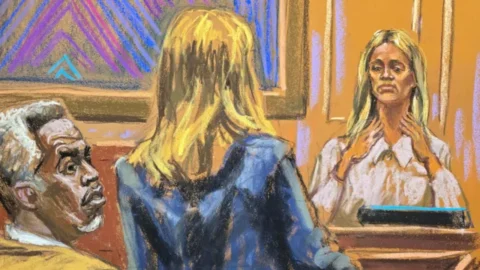Ukrainian Eurovision contestant Khrystyna Starykova has been struck by tragedy just days before her performance, as her home in Myrnograd was destroyed by Russian shelling.
The 19-year-old singer, currently in Switzerland rehearsing with the band Ziferblat, shared heartbreaking images of her damaged apartment block on social media.
The building in the Sviltly neighborhood appeared devastated, with smoke rising, windows shattered, and balconies collapsed. “Home. And I dreamed so much of returning home,” she captioned the post, capturing the pain of seeing her childhood memories reduced to ruins.
In the midst of the destruction, she expressed relief that her loved ones were unharmed. “Fortunately, all my relatives and friends are alive and well,” she wrote, vowing to perform at Eurovision “for the sake of our country.”
In an emotional interview with Ukrainian broadcaster Suspilne, Starykova revealed that she had always feared this moment. “Four months ago, my grandmother lost her home – it was just such a big hole,” she recounted.
“Then my aunt lost the roof over her head. I understood that maybe I could be the next one and, unfortunately, it happened.” Her words carried a sense of painful inevitability, reflecting the constant fear that Ukrainians near the frontlines live with.
“It’s very terrible news. I had really hoped to go back,” she added, her voice heavy with sorrow. The destruction of her home is a stark reminder of the human cost of the ongoing conflict, a reality that has become all too familiar for her.
Starykova’s home in Myrnograd is less than five miles from the frontline, near the industrial city of Pokrovsk, a critical battleground in Ukraine’s eastern front.
Despite the devastation, the young singer has chosen resilience over despair. In another Instagram post on Tuesday, she shared footage of the bomb-damaged streets of her hometown.
“I always went home from vocal lessons this way,” she wrote, her words a poignant reminder of the everyday life now turned into a warzone. It was a place filled with memories, now scarred by the brutality of conflict. Yet, her determination to stand strong shines through, even in the face of such loss.
The band Ziferblat, with whom Starykova is performing, will represent Ukraine at the Eurovision Song Contest with the song “Bird of Pray.”
The song tells the story of Ukrainians separated from their loved ones by the war, a narrative that now feels painfully personal for Starykova.
“It’s about our problems we go through, the tragedy for the last three years,” lead singer Valentyn Leshchynskyi explained in an interview with Eurovision fansite Wiwibloggs. “To be honest, the last eleven years.”
For Starykova, who is a backing vocalist in the band and is affectionately called “bird girl” for her soaring high notes, the song has taken on a new depth of meaning.
Starykova’s musical journey has always been tied to her homeland. Born in Donetsk, she spent her childhood in Myrnograd, experiencing the brutal reality of war from a young age. “When it all started, I was just in shock,” she told local news outlet The Eastern Variant, recalling the shelling in 2015.
“The whole sky lit up and we started running to hide in the corridor. That was the first time I felt it all.” These experiences have shaped her not only as an artist but also as a symbol of resilience.
Despite the conflict, music became her escape, and she went on to compete in the Ukrainian version of The Voice, where she reached the grand final.
Her talent led her to Kyiv, where she studied at the prestigious Glière Music College. Yet, even in the Ukrainian capital, her heart remained in Myrnograd.
“I always planned to go back,” she once said in an interview. For Starykova, her hometown was more than just a place — it was part of her identity, a place she had hoped to return to even after her rise to fame. But now, that dream has been shattered, replaced with a painful reality that millions of Ukrainians continue to endure.
Despite the personal tragedy, Starykova is determined to take the Eurovision stage with courage. “Despite what happened to me, I want to portray our song in a good way,” she declared in a recent TV interview.
“And just to convey our main message, that everything will be fine.” For her, the performance is more than just a competition; it is an opportunity to share her story and that of millions of Ukrainians affected by the war. Her voice, carrying both pain and hope, has become a powerful symbol of her country’s resilience.
The story of Khrystyna Starykova is one of strength amid suffering, a young artist who has chosen to channel her pain into her music.
Her journey to the Eurovision stage is not just about a quest for musical glory; it is a testament to the courage of Ukrainians who continue to dream, sing, and hope despite unimaginable hardships. “I’m holding on for us,” she said, her voice a quiet but resolute declaration.
As she takes the stage in Switzerland, her performance will be a powerful reminder of the resilience of the human spirit.
For the millions who will watch her perform, Starykova’s voice will be more than just a melody — it will be a cry for peace, a tribute to her destroyed home, and a message of hope that even in the darkest times, dreams cannot be destroyed.









